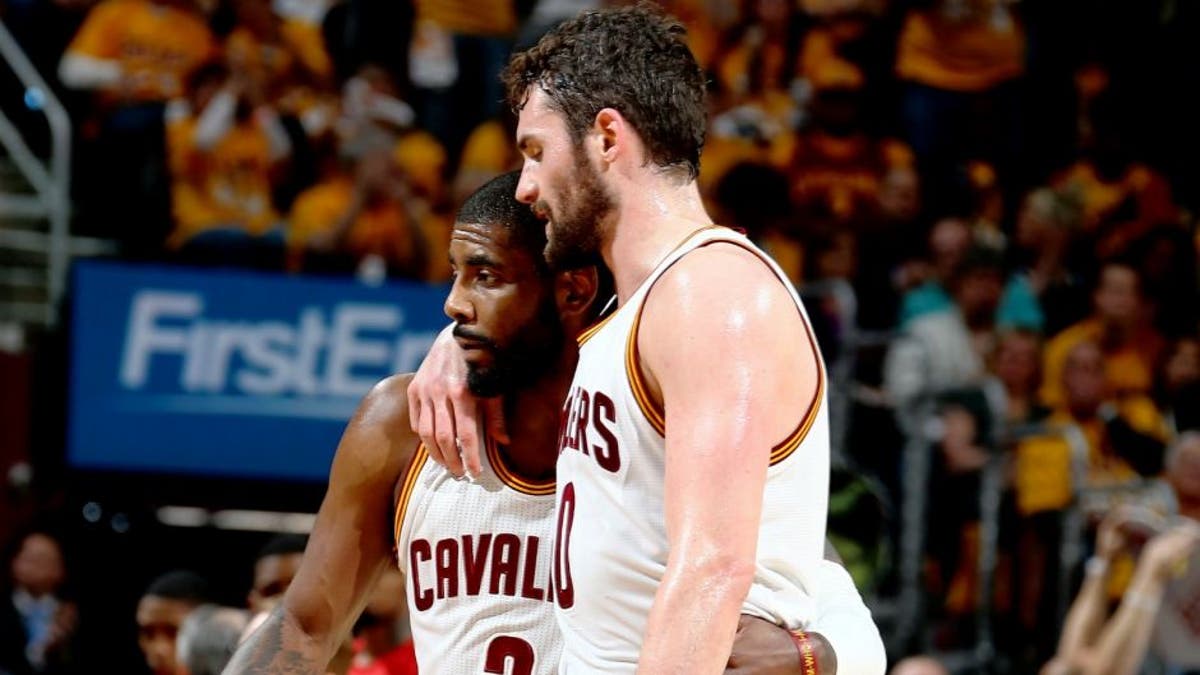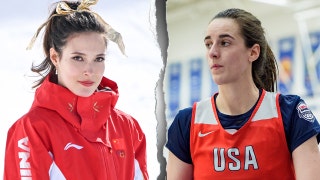
CLEVELAND, OH - MAY 17: Kyrie Irving #2 and Kevin Love #0 of the Cleveland Cavaliers are seen during the game against the Toronto Raptors in Game One of the Eastern Conference Finals during the 2016 NBA Playoffs on May 17, 2016 at Quicken Loans Arena in Cleveland, Ohio. NOTE TO USER: User expressly acknowledges and agrees that, by downloading and or using this Photograph, user is consenting to the terms and conditions of the Getty Images License Agreement. Mandatory Copyright Notice: Copyright 2016 NBAE (Photo by Nathaniel S. Butler/NBAE via Getty Images)
The Cleveland Cavaliers have no reason to panic after losing their first game of the playoffs on Saturday night.
In the 99-84 loss against the Toronto Raptors, Kevin Love and Kyrie Irving combined to make four of 28 shot attempts (including 2-for-11 behind the three-point line) and Bismack Biyombo morphed into Bill Russell. It was more strange than meaningful.
All is well in Cleveland. The Cavs are better than the Raptors and will soon head into the NBA Finals with (presumably) plenty of time to rest and prepare for their next and last opponent of the season.
The potency of Cleveland's offense is the most meaningful and significant development in these playoffs. This team could always shoot threes, but what they've done over the past few weeks is virtually unprecedented, nailing 43.5 percent of an absurd 33.8 attempts per game (both numbers lead the playoffs). To boot, LeBron James is doing irreparable damage below the free-throw line, obliterating single coverage and cracking through double teams to almost always find an open teammate on the perimeter.
He's never had more room to operate, both as a screener and post-up threat; James' willing acceptance of typical big-man duties might be more horrifying than how damn good he is in the role. But despite LeBron locating the fountain of youth and Love and Irving playing some of their best ball from the past two years, the Cavaliers still have question marks. Most notably: Is this defense good enough to win it all?
In 11 playoff games, the Cavaliers have allowed 104.4 points per 100 possessions. That would rank 17th in the regular season, and to date, nine of 16 playoff teams have a better defensive rating. Consider that Cleveland's opposition isn't all that great and the situation only gets worse. The Cavs faced the regular season's 15th (Detroit Pistons) and 18th (Atlanta Hawks) offenses before their dance with the Raptors, a top-five outfit that melted into a static zombie movie about a month ago.
Since 1997, only two teams won a championship with a worse defensive rating than what Cleveland's currently is: The Los Angeles Lakers in 2000 (104.7 points per 100 possessions) and the Lakers in 2010 (105.1 points per 100 possessions). It's heedless to make any conclusive statements from an 11-game sample size, but when you watch Cleveland play defense over a multi-game stretch, the one thing that stands out is how difficult it is to really gauge how good or bad they really are. This was a top-10 defense during the regular season, and it's two most common five-man playoff units are stout.
The ceiling is high but the floor is low. Communication issues persist alongside frequent mental errors and uncorrectable physical limitations. We'll start with that last point.
Size matters. With Timofey Mozgov glued to the bench and presumably out of Tyronn Lue's rotation unless something very bad happens, Tristan Thompson is the closest thing the Cavaliers have to traditional rim protection. Opponents are shooting 58.4 percent at the rim against them right now, a number only "topped" by the Charlotte Hornets in the playoffs. (For comparison's sake, the Pistons allowed the highest field goal percentage at the rim during the regular season: 56.2 percent.)
Opponents shoot 53.6 percent when Thompson defends the basket. It's not a great number, but makes him look like a 29-year-old Dikembe Mutombo when compared to the gravity-challenged Love, who allows a disturbing 67.1 percent at the basket. Channing Frye actually moves his feet pretty well and is the longest of the bunch, but he only holds shooters to 60 percent at the basket. It's safe to say that a more intimidating interior presence would help Cleveland protect its own paint, but not all the team's struggle is the frontcourt's fault.
Besides Iman Shumpert, James and Matthew Dellavedova, Cleveland's options on the perimeter aren't that great. Irving is fine enough as an on-ball defender. He has quick hands, light feet, solid reflexes and is stronger than you think. But he doesn't punch through screens as hard as he should; oftentimes he'll go under a pick when he should slide over it.
Irving falls asleep of the ball and tends to find himself a step or two out of position; when hiding out in the corner, he'll hesitate on a weak side rotation and leave the paint wide open for a roll man to do damage.
The Cavaliers allow 107.7 points per 100 possessions when Irving is on the floor and a Spurs-ian 93.8 points per 100 possessions when he sits. Now, that huge gap isn't solely because Dellavedova is the superior defensive option: Teammates, opposing lineups and meaningless garbage time data all play a role. But, on the other hand, this isn't a brand new phenomena. The Cavaliers are a better defensive team with their starting point guard on the bench. It's been that way since James, Love and Irving first joined forces.
These various positional weaknesses aren't deal breakers, but they do make winning a championship all the more difficult, particularly during inevitably crucial stretches when either their three-point shots aren't falling or the opposing defense can strategically take them away.
But Cleveland's furnace is still its ability to score, and there are important ways where good offense makes them less vulnerable on the other end. If this were the regular season, the Cavaliers would rank first in opposing second-chance points, fast-break points and points off turnovers.
Solid floor balance, tremendous defensive rebounding, an ability to avoid fouls and sink every single shot they take (which allows them to set up their defense and not get attacked in transition) are all reasons why Cleveland isn't a total sieve. But these qualities may not be sustainable in the Finals. The Warriors and Thunder each possess an offense that can go shot for shot against the Cavaliers without passing out.
That means LeBronâwho, by the way, is still one of the best individual and team defenders in the world when he's locked in and wants to beâand company still need to tighten a few screws on the other end if they want to win it all.








































